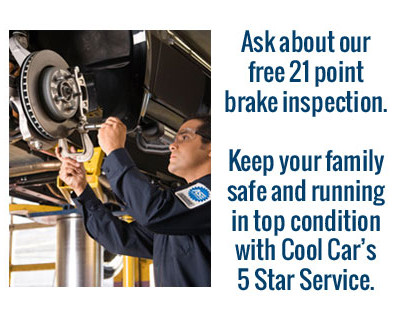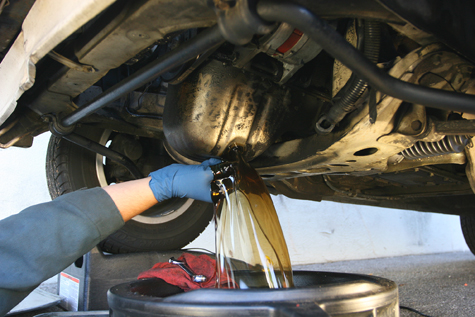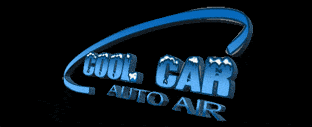We have a State-Of-The-Art 12 bay modern facility with all the latest test equipment including computer diagnostic and vehicle interface equipment. We have a Super Clean Customer Lounge and we are only 25 feet from McDonalds. Our Customers come FIRST. Come see!!!
A/C Service and Diagnostic Procedure
Cool Car Auto Air is YOUR Cooling System Specialist
Your cooling system is what keeps your car from having a meltdown. If you didn't have some way to cool things off, your engine would turn into a solid block of useless metal in no time flat.
It is very important that the cooling system be serviced at least once each year.
Our A/C Service and Diagnostic Procedure consists of the following list of checks and inspections:
- Check the operation of the blower motor
- Check the vent outlet Volume (Service Volume)
- Check the condition of the drive belts and tension
- Check the condition of the drive belt tensioner
- Inspect the low Pressure Hoses
- Inspect the Drier/Accumulator for corrosion, rust, leakage
- Check the upper Radiator Hose
- Check and Clean the condenser
- Check the lower radiator hose
- Check the operation of the Compressor Clutch and bearing
- Check for proper operation of the Condenser/Radiator cooling fans
- Inspect for proper Compressor Clutch Air Gap
- Pressure Test the Suction side of the A/C system
- Pressure Test the Discharge Side of the A/C system
- Inspect the Evaporator Case if possible for visual damage/cracks
- Check for proper air flow across the Condenser and Radiator
- Check Engine Compartment vacuum lines for heat related deterioration
- Check coolant level on cool engines and adjust as needed
- Inspect Engine Compartment Heater Hoses for wear and coolant leaks
- Check A/C Service Valves and install new caps when needed
- Perform a complete Electronic Leak Test.
-----------------------------------------------
Additional Diagnostic time may be needed for more advanced refrigeration problems and electrical problems.
Brake Service
Cool Car Auto Air is YOUR Brake Specialist
 Most vehicles today have disc brakes. Disc brakes slow your vehicle by using calipers to squeeze the brake pads against the rotating rotor. A benefit of disc brakes is their great efficiency and ability to dissipate heat fast, which is generated during braking.
Most vehicles today have disc brakes. Disc brakes slow your vehicle by using calipers to squeeze the brake pads against the rotating rotor. A benefit of disc brakes is their great efficiency and ability to dissipate heat fast, which is generated during braking.
Preventative Maintenance
Cool Car Auto Air is YOUR Preventative Maintenance Headquarters
Our recommended preventative maintenance services include:
- Oil change, lube, and filter
- Tire rotation
- Brake and transmission fluid replacement
- Clean fuel injector
- Air filter inspection and replacement
- Transmission inspection
- Radiator inspection and service
- Fan belt inspection and replacement
- Vehicle inspection
- Tune-up
- Air conditioning service
- Battery inspection
- Factory-scheduled maintenance
Oil Change
 One of the most common tasks to perform is replacing your engine oil. Frequent oil changes are supposedly the most important thing you can do to maintain and prolong the life of your engine. With the better oils that are available today, the requirement for frequent changes is diminishing. Even though most new car manufacturers now recommends oil change intervals that are much farther apart than in the past, I usually recommend that you keep the changes under the 3,000-mile limit. If you don’t drive your car too often, you should change the oil at least 4 times a year to keep things fresh.
One of the most common tasks to perform is replacing your engine oil. Frequent oil changes are supposedly the most important thing you can do to maintain and prolong the life of your engine. With the better oils that are available today, the requirement for frequent changes is diminishing. Even though most new car manufacturers now recommends oil change intervals that are much farther apart than in the past, I usually recommend that you keep the changes under the 3,000-mile limit. If you don’t drive your car too often, you should change the oil at least 4 times a year to keep things fresh.
One of the few maintenance items that automobile manufacturers have not found a way to eliminate. Regular oil changes are the best way to ensure longer engine life. If you frequently take short trips where the car doesn't always completely warm up, then oil changes are even more important because acid and moisture buildup does not have a chance to burn off. Some new engines normally run very hot and are very hard on oil. Even missing a single oil change on these cars can cause an engine to develop sludge which can cause engine damage in as little as 15,000 miles.
Today's modern oils contain detergents and additives that are designed to protect against sludge formation, but if you regularly do a lot of stop and go driving, like rush hour driving, engine heat will eventually break down these additives so that they stop protecting your engine. Sludge problems are NOT covered by a new car warranty. You could be stuck with a bill for major engine work! It happens more times than you think, usually to people who lease their car and think that they can get away with not doing proper maintenance.
The best way to protect yourself is with regular oil changes and save your receipts for your permanent records.
When an oil change service is referred to as an "Oil, Lube & Filter," the "lube" is a chassis lubrication where the mechanic applies grease to various steering and suspension joints under the car. Most modern cars are manufactured with sealed-for-life joints that do not have grease fittings; however if any of these parts were replaced, the new parts probably do have lubrication points and must be greased to prevent premature wear. If you have had parts replaced, make sure that the mechanic knows it or he may overlook them.
Doing an oil change yourself does not require much skill, but crawling under a car and having oil drip down your sleeve is hardly worth the $5 or so that you might save. Then, you have to deal with the old oil and filter. I could think of a more productive way to spend a Saturday afternoon. Cool Car is ready to fully service your vehicle.
